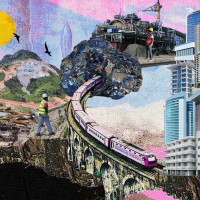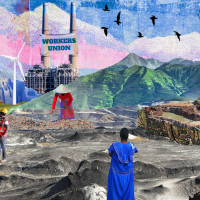La política industrial verde Digging Deeper: Conversaciones sobre minería y transiciones justas
¿Qué significa la “política industrial verde” para las comunidades en la primera línea de riesgo, el Sur global y la justicia mundial? A continuación analizamos las transiciones lideradas por Estados, los legados coloniales y las visiones democráticas que definen el futuro de enfoques equitativos e internacionalistas a una economía justa y sostenible.
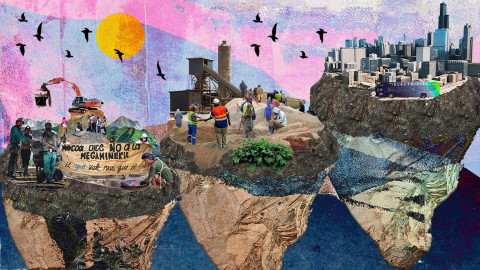
Illustration by Fourate Chahal El Rekaby
Definir la política industrial verde
Katie: Muchas gracias a todos por participar. Thea, ¿podrías comenzar por decirnos qué es la política industrial verde?
Thea: Es una gran pregunta. Probablemente sea mejor comenzar por lo que significa la política industrial, porque “verde” es una nueva adición a un viejo concepto. En el Sur global, especialmente en América Latina, a veces se lo denomina “desarrollismo”. La política industrial o las políticas desarrollistas intentan lograr una transformación estructural de la economía, con un objetivo en mente. Ese objetivo puede ser el crecimiento, ascender en la cadena de valor o el desarrollo social o económico. En cuanto al aspecto “verde”, el objetivo está relacionado con ecologizar la economía mediante la descarbonización, o a través de otros objetivos, como reducir la huella material o ecológica de los procesos económicos. Entonces, la política industrial verde es cuando el Estado interviene en los procesos económicos con una orientación “verde” o un objetivo de desarrollo.
Y ello genera algunas preguntas. Una tiene que ver con la relación entre el Estado y la economía o el Estado y el capitalismo. Estamos hablando de políticas públicas que reconfiguran la economía al estimular nuevos sectores económicos; o construyen y coordinan nuevas cadenas de suministro; o insertan a la economía de un modo diferente en el sistema mundial. En la definición de política industrial, la economía no está fundamentalmente separada de la esfera política. No tenemos al libre mercado por un lado, y las políticas por otro. Está claro que en el capitalismo, el Estado desempeña un papel central en el proceso de acumulación y reproducción social, pero ese papel es más visible cuando los actores estatales están redefiniendo la economía en función de determinadas metas.
Otra pregunta es: ¿a qué Estados nos referimos? Los Estados no abordan su economía nacional o la economía internacional del mismo modo. Se forjó el sistema mundial, que sigue estando determinado por las relaciones coloniales y neocoloniales, donde los mecanismos comerciales y la arquitectura financiera tienden a reproducir, con pocas excepciones, una desigualdad que se remonta a 500 o 600 años atrás. Estos no se transformaron drásticamente como consecuencia de la descolonización o los esfuerzos del Sur global de cambiar su posición en la economía mundial. Hay excepciones importantes, como China, Brasil o Indonesia. No es que los Gobiernos del Sur global no puedan cambiar su posición o economías nacionales, pero entran en el juego en inferioridad de condiciones.
Cuando el Gobierno estadounidense implementa la política industrial, lo hace desde una posición diferente en cuanto al espacio fiscal, monetario y de políticas que los Gobiernos del Sur global. Aun así, determinar las actividades de los inversores capitalistas no es una tarea fácil. Es aún más difícil en un Estado que tiene menos peso geoeconómico, ocupa un lugar más bajo en la cadena de valor y tiene una industria manufacturera más extractiva y que paga salarios más bajos.
¿Qué significa que la política industrial sea verde? Aún está por determinarse. ¿Significa intentar incentivar una transición energética? ¿Intentar descarbonizar a los sectores más intensivos en carbono? ¿Significa abrir sectores completamente nuevos? ¿Qué lugar ocupan el medio ambiente natural y la biodiversidad? A menudo pensamos únicamente en la transición energética y no en el marco ecológico más amplio del cual forman parte las economías. De modo que hay muchas preguntas sobre lo que se considera verde, pero también hay dificultades y riesgos en torno al ecolavado y las soluciones falsas. Deberíamos también examinar el poder y las capacidades de los Estados para aplicar estas políticas industriales.
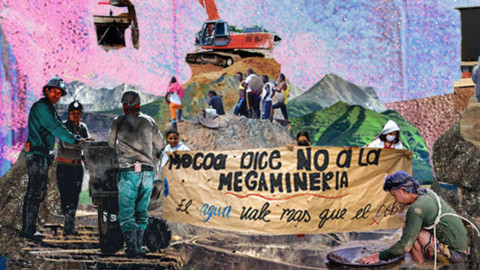
Política verde y el Sur global
Katie: Muchas gracias, Thea. Como Thea mencionó, algunos países del Sur global esperan utilizar la fiebre de los minerales de “transición” para “ascender en la cadena de suministro” o renegociar su lugar en la economía mundial. Kennedy: ¿podrías hablar sobre la nacionalización de los recursos, el desarrollo liderado por los Estados y tu investigación en Zimbabwe? ¿Qué se debe hacer en forma diferente en una nueva ola de política industrial verde?
Kennedy: Esta es una pregunta importante en África en este momento, porque el discurso actual es todo sobre el poder de acción de África. ¿En qué medida somos Estados soberanos e independientes de nuestros ex colonizadores, los europeos? ¿En qué medida como africanos, controlamos, somos propietarios y gestionamos los medios y factores de producción, la distribución de alimentos, la extracción, el consumo, la exportación, las finanzas, el valor añadido y la beneficiación [procesamiento de menas]?
Esta pregunta se ha planteado desde la época del colonialismo y el movimiento de liberación. Cuando el movimiento abolicionista estaba luchando por la independencia, la cuestión era la tierra: el lugar donde se encuentran nuestros minerales. Entonces, la cuestión del “nacionalismo de recursos” recibió más atención. Los países que se independizaron —Nigeria, los países norafricanos, Sudáfrica— intentaron aplicar políticas de diferentes modos, con diferentes resultados.
En mi investigación de doctorado en Zimbabwe estudié la aplicación del “Programa de Indigenización y Empoderamiento Económico”. El objetivo del programa era transferir un mínimo del 51 por ciento de las empresas extranjeras a los ciudadanos indígenas o locales, o a los Gobiernos locales. Hubo muchas cuestiones de definición en torno a quién es indígena y quién no. Esto resultaba especialmente pertinente en las industrias extractivas, debido a que Zimbabwe está realizando una transición de la economía basada en la agricultura a una economía basada en la extracción. Analicé el cambio en el porcentaje de la propiedad. La aplicación del programa se topó con muchas dificultades, entre ellas, obviamente, la fuga masiva de capital al país vecino, Sudáfrica: muchas empresas huyeron del país o disminuyeron su tamaño. El programa se implementó entre 2010 y 2017, durante el Gobierno del presidente Mugabe. Después de ello, regresamos a un enfoque neoliberal basado en el mercado, en el que cualquier persona del mundo podía venir a Zimbabwe y reclamar el 100 por ciento de propiedad de los medios de producción en la minería. Ello generó un gran daño al desarrollo de la economía.
Con respecto a la política industrial verde, Zimbabwe tiene los quintos o sextos yacimientos más grandes del mundo, y los más grandes en África. Tenemos 5 grandes empresas de litio, todas ellas de propiedad y control mayoritario chinos: algunas en un 100 por ciento y otras en un 85 por ciento. En 2022, el Gobierno impuso una prohibición a las exportaciones de litio en bruto para alentar la adición de valor, garantizar el procesamiento de litio en el país y defender los empleos nacionales. Las empresas se vieron obligadas a establecer plantas procesadoras en el lugar.
La extracción de cobalto, litio y otros materiales fundamentales constituye el 0,6 por ciento del total de la cadena de valor. Si se agrega la fundición, creo que llega al 1,6 por ciento. Ello significa que los países de origen no se benefician de la minería. Es por eso que Zimbabwe siguió el ejemplo de Indonesia, que prohibió la exportación de níquel. Zimbabwe hizo lo propio, seguido por Namibia. Ahora Ghana, Chile, y Bolivia están hablando de hacer lo mismo. Se está propagando una ideología de nacionalismo de recursos y adición de valor en los países productores de “materias primas fundamentales”.
¿Cómo podemos beneficiarnos de la descarbonización de la economía y la transición energética? En África, la narrativa es: primero debemos recentrarnos en el poder de decisión de África. Sudáfrica está experimentando con las “Asociaciones para una Transición Energética Justa”. En la COP26 sobre cambio climático, se creó una asociación, y donantes internacionales (la Unión Europea, Alemania, Estados Unidos, entre otros) prometieron de 8.000 millones a 11.000 millones de dólares a Sudáfrica. Ahora, Sudáfrica debe realizar su propia investigación: ¿cuánto necesitamos realmente para una transición energética sin trabas, justa, inclusiva y sostenible?
El Gobierno lanzó el Plan de Aplicación de una Transición Energética Justa el año pasado y la cifra es sorprendente: para una transición energética sostenible, justa e inclusiva, el país necesita 95.000 millones de dólares. Pero, ¿de dónde se está obteniendo el dinero? Sudáfrica tiene enormes yacimientos de carbón. Si su producción actual se mantiene, el país tardaría más de 200 años en agotar su carbón. La narrativa es descarbonizar al mundo y la economía, y abandonar el carbón. Pero ¿de dónde van a obtener el dinero? Existen muchas contradicciones en África. Tenemos gas natural licuado, petróleo y carbón, y nos dicen “no lo utilicen”. El modo en que se enmarca la “asociación para una transición energética justa” no es un concepto africano. Entonces, ¿por qué debemos copiar el modelo del resto del mundo, aplicarlo en el modo en que lo diseñan ellos, sin realizar cuestionamientos? Debemos examinarlo críticamente.
Perspectivas del Sur global sobre transiciones justas
Katie: Muchas gracias. La cuestión de la financiación y qué visiones de transición justa provienen verdaderamente del Sur global, frente a las visiones impuestas por Europa, América del Norte y los centros históricos de poder imperial es muy importante.
Lala, ¿podrías contarnos sobre tu trabajo con TUED y cómo una transición más democrática y de propiedad pública podría contribuir a resolver algunas de estas tensiones?
Lala: En TUED utilizamos el término “trayectoria pública”, ya que entendemos que una trayectoria hacia una transición energética justa será diferente en contextos diferentes. Indonesia, por ejemplo, depende enormemente del carbón para la exportación. Colombia también dependía históricamente del carbón, pero ahora su generación eléctrica es descarbonizada en alrededor de un 70 por ciento, con una red más diversificada y con más posibilidades para la descarbonización.
Una trayectoria pública comporta diferentes elementos. El primero es hacer efectivo el derecho a la energía: restablecer el mandato, la obligación y la capacidad de los organismos públicos para erradicar la pobreza energética. Un segundo paso es identificar y revertir las leyes neoliberales en el sector de la energía, o en este caso, de la minería. El Gobierno de Petro en Colombia está en proceso de revertir el Código de Minas de 2001, que entregó recursos mineros en bandeja a empresas multinacionales privadas y les otorgó condiciones favorables, lo cual tuvo impactos sociales y ambientales considerables. Se están entablando conversaciones y ha sido un proceso muy participativo. No es perfecto, pero hay mucho que aprender del proceso, que es liderado por el Ministerio de Minas y Energía de Colombia, con el apoyo y la presión desde abajo de los movimientos sociales y de trabajadores. Este año celebraron una cumbre de alrededor de 1500 personas en Bogotá para redactar la nueva ley de minería con la participación de representantes de pequeñas asociaciones y colectivos de mineros, consejos comunitarios y asociaciones de energía vinculadas con organizaciones de defensa del derecho a la vivienda. Fue un ámbito muy diverso y el proyecto de ley ahora está siendo debatido lentamente en el Congreso.
Un tercer paso hacia una trayectoria pública es aplicar este mandato propúblico. En América Latina, esto incluye desarrollar estas visiones políticas con los pueblos indígenas. En Colombia, las comunidades negras y campesinas son extremadamente importantes y poderosas, y han contribuido a la Constitución actual. Debemos abordar lo que significa en un sentido más crítico obtener “consentimiento libre, previo e informado”, de conformidad con una visión de justicia. Ese es un aspecto importante de llevar a cabo este mandato propúblico. La propuesta para Ecominerales está haciendo justamente eso. Esta propuesta de la Agencia Nacional de Minería de Colombia de momento recién ha pasado la primera ronda de debates en el Congreso, pero es muy interesante.
Una trayectoria pública también debe tener un enfoque público planificado para la transición energética. En América Latina vemos titulares sobre un incremento del 500% de la demanda de tal o cual recurso, y es una locura. El modo en que se está informando sobre esto es infiltrando discusiones en el Congreso. Los ministerios de minería, como el de Perú, dicen: “nuestro principal deber con el país es desbloquear la resistencia comunitaria por todos los medios necesarios” —y es totalmente descabellado—.
Los países y las comunidades de América Latina deben resistir a esa presión. No sabemos lo que sucederá en 10, 20 o 30 años. Estas proyecciones a menudo no se hacen realidad. Para tener un enfoque planificado para la minería debemos tener una producción de tecnologías diversificada; trabajar en forma interregional, y tener alianzas público-privadas. Debemos imponer metas obligatorias de conservación de energía en toda la economía y aplicar nuestras propias prioridades en el empleo, las protecciones ambientales y los programas de investigación pública. ¿Cómo queremos utilizar nuestros recursos y para qué fines?
Ecominerales, que acabo de mencionar, fue presentada como una empresa estatal de minería en Colombia, como la Ecopetrol de la minería —Ecopetrol es la empresa de petróleo de Colombia que es 80 por ciento propiedad del Estado—. Hay una cita célebre de Álvaro Pardo, el director de la Agencia Nacional de Minería, que dice que la riqueza minera más importante de Colombia no es el carbón, sino las vidas de los mineros y las comunidades que dependen de estos minerales, y pregunta qué políticas serían necesarias para restablecer la regulación del sector y recuperarlo de los actores armados, ilegales y paramilitares, que han hecho que el sector minero sea extremadamente violento en Colombia. Una gran parte de la financiación de la empresa también procura movilizar el retorno de los activos provenientes de la recisión de títulos mineros: muchas empresas multinacionales se están yendo del país porque prevén que obtendrán mayores ganancias en otra parte, y están abandonando las minas en condiciones terribles. El Estado está intentando recibir estos activos, cerrar algunas minas responsablemente, pero quizá reactive otras. Esa es una de las contradicciones de esta transición: las empresas mineras se van y dejan un desastre tras de sí, y el Estado debe hacerse cargo.
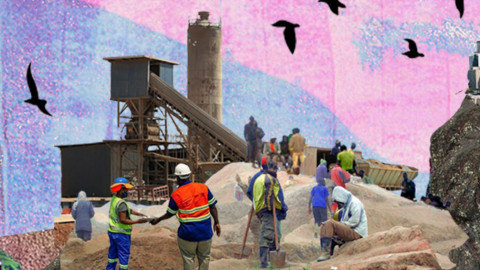
Los movimientos de base y el derecho de decir “no”
Katie: Thea, sobre la base de tu trabajo en el Climate and Community Institute, ¿cómo podemos negociar las demandas de una transición energética y el derecho de los movimientos de base y las comunidades más vulnerables a decir “no”? ¿Cómo pueden estos movimientos trabajar en conjunto?
Thea: En primer lugar, no se puede subestimar el impacto ambiental de la minería. Es lo que algunos científicos denominan un cambio drástico irreversible en el uso de la tierra, con repercusiones en los ecosistemas, las cuencas hidrográficas y los cursos de agua que pasan por esa tierra. Para las comunidades que viven allí y dependen de la tierra —comunidades indígenas, campesinas y otras comunidades que dependen de la tierra para su subsistencia y prácticas culturales— la minería es devastadora.
La minería también es una base insegura para las economías y el desarrollo nacionales debido a que está vinculada con los mercados de productos básicos a nivel mundial, que son muy volátiles y susceptibles a oscilaciones de precios considerables. La minería no es fiable desde el punto de vista de la economía política nacional, especialmente en el Sur global, donde los Gobiernos dependen de ella para su base fiscal. Es por ello que los países del Sur global están intentando centrarse en la fase del “consumo”, y dejar de dedicarse únicamente a la extracción, para descender en la cadena de suministro o “ascender en la cadena de valor” (diferentes metáforas espaciales que significan exactamente lo mismo).
También está claro que la minería es uno de los sectores más violentos para los defensores de la tierra y el agua en el mundo. Supera a la agricultura, la forestación y a otros sectores que tienen un historial atroz en materia de derechos humanos. Entonces, cuando hablamos de ampliar la minería sin que haya una reforma en la gobernanza, estamos hablando de aumentar las muertes. Muchas personas mueren debido a conflictos mineros. El año pasado murieron 200 defensores del medio ambiente y la tierra, y probablemente la cifra sea mayor. Es por eso que las comunidades dicen “no”.
En Estados Unidos existe el concepto inútil denominado “no en mi patio trasero”, que significa que las comunidades rechazan nuevos proyectos porque tienen un problema de actitud. Pero la minería transforma los paisajes y puede eliminar los medios de subsistencia existentes. Si las comunidades protestan, son reprimidas violentamente por guardias de seguridad privados o actores estatales. Incluso para las comunidades que viven lejos de los sitios mineros, este no es un camino fiable para el desarrollo económico. Es por eso que hay resistencia y conflicto con respecto a la minería.
¿Cómo lidiamos con el hecho de que un cierto grado de nueva minería es necesaria para la transición energética? Diría “cierto grado”, con discernimiento. Debido a que estoy totalmente de acuerdo con Lala en que algunas de las proyecciones prevén un nivel enorme de minería y deberíamos cuestionar esos modelos y sus supuestos: ¿A qué cadenas de suministro están contribuyendo? ¿Quiénes se benefician de los productos para los cuales estos minerales son insumos?
Es complicado cuando el fin último es la transición energética. En mi investigación he cuestionado “¿cuánta minería?”. Pero, en el corto plazo, cierto grado de minería es necesario. En el mediano a largo plazo, la economía circular puede desempeñar un papel importante, pero no podemos tener una economía circular antes de tener la materia prima reciclada a disposición, y aún no estamos en ese nivel.
La necesidad de un cierto grado de minería es compatible con el derecho de decir “no” e incluso con el decrecimiento. Estamos realizando una transición hacia una nueva infraestructura material de la transición energética, lo que significa que es preciso producir cosas. ¿Cuántas cosas? ¿Para quién? ¿En dónde? ¿Con qué división de ganancias e ingresos? ¿Con qué nivel de aportes comunitarios? Esas son preguntas políticas y sociales y el resultado de elecciones colectivas que o bien realizamos como personas comunes y corrientes y movimientos, o las élites lo harán por nosotros.
Entonces, ¿cómo logramos que los derechos de las comunidades de determinar sus propios medios de subsistencia y planificación territorial de sus paisajes, en todas las escalas, sean lo más complementarios posibles? Estos son procesos locales, nacionales y regionales. ¿Cómo afrontamos la cuestión de las formas de libre determinación territorial con respecto a si hay minería o no? Esa es una cuestión de soberanía democrática. ¿Cómo combinamos esto con el hecho de que aun para lograr una transición energética justa, realmente descolonial, internacionalista y ecosocialista necesitamos algunos minerales?
Generalmente nos centramos en una mejor gobernanza de la minería en lugares donde existe esta actividad, como Chile, Perú y Colombia. Pero esos Gobiernos y comunidades no son los únicos responsables de crear mejores cadenas de suministro si no hay cambios en el Norte global. En lugar de pedir a los Gobiernos de los Estados periféricos que gobiernen mejor la fiebre minera, ¿por qué no llevamos a cabo una transición energética menos intensiva en recursos en el Norte global y en otras partes del mundo que son destino de esos minerales? Necesitamos una estrategia combinada para alejarnos de sistemas energéticos y de transporte intensivos en recursos, de los vehículos eléctricos individuales al transporte público electrificado, por ejemplo. Un enfoque de trayectoria pública, como mencionó Lala, puede aplicarse al medio ambiente construido, las tecnologías e infraestructuras de la transición energética. La investigación que realicé con mis colegas demuestra que el transporte público masivo, comparado con los automóviles individuales, utiliza mucho menos minerales y alivia la presión en el Sur global.
Otra pregunta es ¿cómo mantenemos los recursos en el Sur global para desarrollar economías soberanas allí, incluidas economías regionalmente integradas? ¿De qué modo pueden los recursos permanecer allí e ingresar en las cadenas de suministro para satisfacer las necesidades sociales?
El derecho a decir “no” —que es un derecho de la soberanía democrática— no será perfectamente compatible con la transición energética, pero algún grado de compatibilidad es posible. Habrá tensiones: compensaciones con una base material real. Incluso en una sociedad justa, es preciso decidir mediante deliberación democrática y protesta dónde colocar una mina o una red. Pero necesitamos un modelo de consumo y producción diferente, un régimen de extracción más racional desde el punto de vista ecológico y social, porque cuanto menos minería haya, menos comunidades estarán sometidas a sus daños y habrá más espacio para que las comunidades se organicen en pro de economías y medios de subsistencia sostenibles. Se han adoptado medidas graduales para abandonar los vehículos eléctricos individuales y adoptar el transporte público de masas. Algunas ciudades utilizan menos autos. Hay lugares que están logrando avances enormes. Pero las comunidades y las metas de transición climática y energética están en un conflicto tan profundo debido a que la transición es muy intensiva en recursos.
Visiones desde abajo
Katie: Muchas gracias, Thea. Vinculaste muy bien estos temas. Lala, ¿dónde ves procesos políticos para negociar y mediar la adopción de decisiones a la que se refiere Thea? ¿Cómo sería una visión de transición justa de base, liderada por los ciudadanos desde abajo?
Lala: En una transición energética orientada por el mercado, en el movimiento de trabajadores hemos sido condicionados a priorizar el “diálogo social” como el proceso fundamental para resolver conflictos. Una trayectoria pública prioriza un enfoque de poder público para resolver estos conflictos y construir los procesos políticos que necesitamos. Ello significa tener consejos comunitarios, consejos de trabajadores y órganos gubernamentales pertinentes en la adopción de decisiones en torno a las políticas de minería. En los espacios de políticas que hemos tenido en TUED-Sur, hemos identificado que los sindicatos y los movimientos sociales aún tienen mucho trabajo por delante para poner sus demandas por escrito, en una forma en que puedan llevarse a la calle y los pasillos del Congreso a fin de presionar a favor de visiones específicas. Es uno de los ámbitos estratégicos que las personas interesadas en estos movimientos, incluidos investigadores y centros de investigación, pueden contribuir a apoyar.
En Chile, por ejemplo, el movimiento sindical está muy fragmentado. Pero los mineros están intentando crear una “federación de trabajadores de las minas de litio” que reúna a todos los diferentes sindicatos que puedan ejercer presión en las empresas de litio (tanto públicas como multinacionales). Es una iniciativa que se ha visto frustrada debido a los intereses empresariales que resisten e intentan cooptar estos procesos. De momento no ha dado resultados satisfactorios, y estos procesos de crear una cohesión entre los trabajadores y la comunidad para plantear reclamos requiere solidaridad internacional.
Colombia es un estudio de caso más optimista debido a que actualmente tiene un Gobierno progresista, pero podría revertirse a la derecha en un par de años. Espero que no sea así. ¿Qué infraestructura de adopción de decisiones podemos instaurar que nos permita seguir construyendo más minería justa si hay un cambio de Gobierno? No solo legislación, sino la construcción de poder y coaliciones que a menudo se ven debilitados cuando hay Gobiernos progresistas debido a la cooptación.
En TUED-Sur recientemente lanzamos una red de centros de investigación que trabajan con sindicatos, como INEP de Brasil, CIPAME de Colombia o Fundación Meridiano de Argentina. Están promoviendo lo que podría ser una trayectoria pública en sus sindicatos y sectores; identificando cuestiones comunes en América Latina que puedan ayudar a determinar el rumbo de una trayectoria pública; y coordinando a nivel regional. Hay mucho trabajo por hacer —y eso es muy motivador, pero el camino es largo.
Reparaciones y justicia energética
Katie: Kennedy, sobre la cuestión del internacionalismo y cómo los ex países colonizados pueden lograr una transición energética justa, ¿podrías hablarnos de la discusión sobre las reparaciones?
Kennedy: Con respecto a las reparaciones ecológicas, la brecha metabólica ha ocurrido desde el colonialismo europeo durante los últimos 500 años. Un tipo de expiación que los africanos están exigiendo son reparaciones por el cambio climático, incluido el Fondo de Respuesta a las Pérdidas y los Daños en virtud de la Convención Marco de las Naciones Unidas sobre el Cambio Climático (CMNUCC). Europa y América del Norte se industrializaron a expensas de nosotros, los africanos. Estamos sufriendo los impactos del cambio climático como consecuencia de la industrialización del Norte global, incluso mientras se están tomando recursos de África. Entonces, los africanos exigimos el cumplimiento de una obligación moral mediante el pago de reparaciones. La cancelación de la deuda podría ser un modo de lograrlo. También necesitamos que el Norte global asegure la creación del Fondo de Respuesta a las Pérdidas y los Daños al que se comprometió. Muchos países donantes no están cumpliendo sus promesas de financiación para el clima. Es por ello que el impacto del cambio climático en África es tan grande: somos vulnerables y no contamos con medidas de mitigación y adaptación. En 2019, hubo un enorme ciclón, el ciclón Idai, que afectó considerablemente a Mozambique, Malawi, Zimbabwe y partes de Sudáfrica. El ciclón arrasó comunidades enteras y los impactos aún se sienten.
Con respecto a la transición energética justa, los africanos están hablando sobre necesidades energéticas. En primer lugar, debemos realizar la transición a la energía limpia a nuestro propio ritmo. ¿Cuál es la contribución de todo el continente africano a las emisiones de carbono? Menos del 4 por ciento. Incluso con todas nuestras industrias. Entonces, ¿por qué debemos reducir nuestro carbón, nuestro gas licuado o lo que sea? Lo que decimos es que no necesitamos una transición que siga el modelo o esté bajo el mando de quienes no son africanos.
Para que una transición sea justa, debe colocar a las comunidades en el centro. No debe promover la “acumulación mediante la descarbonización”. Debemos preguntar, ¿quién se beneficia de los créditos de carbono? Estamos creando un producto artificial. Dicen: ¿Ustedes en África con su gran bosque, pueden vender su bosque a una empresa en otro lado, que paga por él en lugar de reducir sus emisiones”. ¿Por qué no están abordando la fuente de las emisiones? ¿Por qué vienen a decirnos: asegúrense de no deforestar este bosque. Entonces, las comunidades no pueden desarrollar sus actividades habituales porque son desplazadas.
Las poblaciones también son desplazadas por la minería, pero ¿se están beneficiando de ella? Por supuesto que no. Entonces tienen derecho a decir “no”. La extracción de estos minerales es solo un 0,6 por ciento del total de la cadena de valor, y las personas están siendo expulsadas de sus tierras ancestrales por eso. Entonces, la transición debe tener lugar de conformidad con lo que nosotros definimos que es justo.

Reparaciones y justicia energética
Katie: Kennedy, sobre la cuestión del internacionalismo y cómo los ex países colonizados pueden lograr una transición energética justa, ¿podrías hablarnos de la discusión sobre las reparaciones?
Kennedy: Con respecto a las reparaciones ecológicas, la brecha metabólica ha ocurrido desde el colonialismo europeo durante los últimos 500 años. Un tipo de expiación que los africanos están exigiendo son reparaciones por el cambio climático, incluido el Fondo de Respuesta a las Pérdidas y los Daños en virtud de la Convención Marco de las Naciones Unidas sobre el Cambio Climático (CMNUCC). Europa y América del Norte se industrializaron a expensas de nosotros, los africanos. Estamos sufriendo los impactos del cambio climático como consecuencia de la industrialización del Norte global, incluso mientras se están tomando recursos de África. Entonces, los africanos exigimos el cumplimiento de una obligación moral mediante el pago de reparaciones. La cancelación de la deuda podría ser un modo de lograrlo. También necesitamos que el Norte global asegure la creación del Fondo de Respuesta a las Pérdidas y los Daños al que se comprometió. Muchos países donantes no están cumpliendo sus promesas de financiación para el clima. Es por ello que el impacto del cambio climático en África es tan grande: somos vulnerables y no contamos con medidas de mitigación y adaptación. En 2019, hubo un enorme ciclón, el ciclón Idai, que afectó considerablemente a Mozambique, Malawi, Zimbabwe y partes de Sudáfrica. El ciclón arrasó comunidades enteras y los impactos aún se sienten.
Con respecto a la transición energética justa, los africanos están hablando sobre necesidades energéticas. En primer lugar, debemos realizar la transición a la energía limpia a nuestro propio ritmo. ¿Cuál es la contribución de todo el continente africano a las emisiones de carbono? Menos del 4 por ciento. Incluso con todas nuestras industrias. Entonces, ¿por qué debemos reducir nuestro carbón, nuestro gas licuado o lo que sea? Lo que decimos es que no necesitamos una transición que siga el modelo o esté bajo el mando de quienes no son africanos.
Para que una transición sea justa, debe colocar a las comunidades en el centro. No debe promover la “acumulación mediante la descarbonización”. Debemos preguntar, ¿quién se beneficia de los créditos de carbono? Estamos creando un producto artificial. Dicen: ¿Ustedes en África con su gran bosque, pueden vender su bosque a una empresa en otro lado, que paga por él en lugar de reducir sus emisiones”. ¿Por qué no están abordando la fuente de las emisiones? ¿Por qué vienen a decirnos: asegúrense de no deforestar este bosque. Entonces, las comunidades no pueden desarrollar sus actividades habituales porque son desplazadas.
Las poblaciones también son desplazadas por la minería, pero ¿se están beneficiando de ella? Por supuesto que no. Entonces tienen derecho a decir “no”. La extracción de estos minerales es solo un 0,6 por ciento del total de la cadena de valor, y las personas están siendo expulsadas de sus tierras ancestrales por eso. Entonces, la transición debe tener lugar de conformidad con lo que nosotros definimos que es justo.
A modo de conclusión
Katie: Muchas gracias. Para concluir, ¿quisieran añadir algo más?
Thea: Gracias. A pesar de mis raíces latinoamericanas y de haber pasado mucho tiempo en América Latina, hablo desde Estados Unidos, aunque mi investigación y mi trabajo de solidaridad es transnacional. Digo esto porque nos estamos centrando principalmente en las oportunidades y limitaciones para los países y movimientos de resistencia del Sur global. Pero las políticas e instituciones del Norte global desempeñan un papel muy importante en establecer las “reglas del juego”. La desigualdad mundial en el poder de adopción de decisiones y el acceso al capital, inversión y finanzas es real.
Una dirección en la que pueden dirigirse las conversaciones futuras es: ¿qué pueden las personas como yo —expertos, defensores y organizadores de orientación internacional, pero radicados en el Norte global— hacer en el Norte global para cambiar estas realidades? ¿Podemos presionar a nuestros propios Gobiernos para que elaboren políticas menos discriminatorias con el Sur global y menos limitantes para su desarrollo? ¿Cómo pensamos las políticas industriales del Norte global? Las nuevas políticas en Estados Unidos y Europa son agnósticas o perjudiciales para las necesidades de desarrollo del Sur global. ¿Qué puedo hacer para movilizar a otros expertos y movimientos? ¿Cómo sería construir una base social más amplia en Estados Unidos para políticas más internacionales y orientadas a la justicia mundial?
Esto es difícil porque Estados Unidos no es homogéneo: hay personas de bajos recursos, la clase trabajadora, gente que atraviesa dificultades, personas de color, migrantes, pueblos indígenas. Quizá no se consideren en absoluto como beneficiarios de las políticas industriales del Norte global —ello los haría más receptivos a una agenda internacionalista de izquierda—. Y cada vez hay más vínculos transnacionales entre movimientos del Norte y el Sur. Lo vemos con el movimiento internacional de solidaridad con Palestina, por ejemplo. Nos estamos organizando más allá de las fronteras nacionales, nuestras luchas están cada vez más conectadas con otros terrenos de lucha, como las luchas sindicales y de la clase trabajadora. También hay coordinación en el Norte y el Sur entre las comunidades marginadas en la primera línea de riesgo que resisten a la minería y los combustibles fósiles, entre comunidades indígenas sudamericanas y norteamericanas, y comunidades marginadas no indígenas. Hay un movimiento transnacional de resistencia antiextractivista y eso es muy interesante.
Por último, también están ocurriendo cosas emocionantes en la frontera entre Estados Unidos y México, hay más solidaridad sindical en las cadenas de suministro de baterías y automóviles. Esta ha sido una nueva prioridad de United Auto Workers (el sindicato de trabajadores del automóvil), que tiene nuevos dirigentes más progresistas. La pregunta fundamental que se plantea es: ¿dónde está la presión de las sociedades y los votantes del Norte global en sus propios Gobiernos para hacer algo diferente en torno a la política industrial y la arquitectura del comercio y las finanzas? Porque estos aspectos están limitando el desarrollo y las posibilidades más transformadoras del Sur global.
Katie: Gracias por tus reflexiones. Ahora pasaremos a Kennedy y luego a Lala.
Kennedy: El cambio climático es un multiplicador de peligros. Provoca sequías, inundaciones y condiciones meteorológicas extremas, que multiplican las crisis que ya afrontamos: conflictos, guerras, subdesarrollo o desindustrialización. ¿Cuáles son los efectos a nivel nacional? Estamos notando conflictos climáticos y fragilidad. Las inundaciones en una parte de un país obligan a la gente a desplazarse. En Sudán del Sur, la población depende del ganado, pero debido a la sequía, se mudan para encontrar agua y mejores pasturas, y terminan compitiendo por esos recursos. Puede ser letal, porque se ven involucrados en grandes conflictos.
¿Qué se puede hacer? Reclamamos reparaciones climáticas y ecológicas, para asegurar que las personas que están en movimiento sean compensadas por la pérdida de sus medios de subsistencia. Las personas que están atrapadas, que no pueden mudarse, también deben ser indemnizadas por el cambio climático. Necesitamos asegurar que esas personas también se beneficien de un Fondo Verde para el Clima.
Con respecto a la geopolítica de los minerales fundamentales en el cinturón de cobre africano —la República Democrática del Congo, Rwanda, Namibia y Zambia— la Unión Europea y Estados Unidos actúan como colectivo, pero firman acuerdos como países individuales. Están reconstruyendo el sistema ferroviario, han gastado alrededor de 2.300 millones de dólares para exportar menas en bruto que contienen cobalto, litio u otros minerales fundamentales de la República Democrática del Congo, Namibia y Zambia a la Unión Europea o Estados Unidos. Y también, China está renovando la red ferroviaria de Tazara desde Zambia a través de Dar es Salaam. Todo se reduce a extraer recursos naturales en estado bruto. Los países africanos no tienen ningún poder de acción en el tema.
Instamos a nuestros Gobiernos en África a que mejoren las condiciones, que se aseguren de que África tenga poder de decisión en la negociación y la aplicación de estos acuerdos, con respecto a la adición de valor y como beneficiarios de los minerales del continente. Que garanticen que las personas comunes y corrientes que están al margen de las cuestiones sociales y económicas también se beneficien.
Katie: Muchas gracias, Kennedy, por resaltar el modo en que la economía de los minerales fundamentales está redefiniendo los patrones económicos imperialistas, de modo que la justicia migratoria y las reparaciones formen parte de la justicia climática y de cualquier tipo de transición justa. Lala, ¿quisieras añadir algo para concluir?
Lala: Lo que Kennedy estaba diciendo sobre el cambio climático como un multiplicador de peligros es totalmente cierto. Está claro que no debemos depender de un sistema motivado por la maximización del lucro, en el cual los Estados reducen el riesgo a la inversión privada. Ese no es la camino hacia una transición justa.
Recuperar estos procesos de adopción de decisiones es difícil porque nos planteamos lo siguiente: imaginen que tenemos que extraer minerales en cierta medida, ¿a quién pertenece la riqueza de estos recursos? Y, ¿en nombre de quiénes la desarrollaremos? Incluso dentro de un país, incluso dentro de un Estado multinacional, esas son las preguntas centrales de la democracia y la soberanía. Entonces, las tensiones son reales, las diferencias son reales. Pero es importante recordar que estas luchas, reivindicaciones y reclamos comunes también son reales, y en eso debemos basarnos para avanzar.
A propósito de las diferencias, cuando hablamos de energía a menudo separamos la “energía comunitaria” de la “energía centralizada”, o la “propiedad comunitaria” de la “propiedad estatal”. Pero hay una multiplicidad de visiones en las que nos podemos basar dentro de ese espectro. Existe la propiedad pública-comunitaria, o la propiedad público-pública que incorpora la toma de decisiones comunitaria. Existen las cooperativas. Soluciones diferentes responderán a necesidades políticas diferentes.
Estoy tomando inspiración de Colombia y de nuestra vicepresidenta Francia Márquez, una activista de Cauca opositora a la minería ilegal, que fue desplazada de su tierra por una empresa de minería ilegal. Lideró una marcha de mujeres negras hacia Bogotá, que recorrió 550 kilómetros en diez días y resultó victoriosa. El hecho de que hoy sea nuestra vicepresidenta significa que las personas que han atravesado estas experiencias pueden decir: “cuando las familias blancas y ricas de Colombia dicen que las comunidades están impidiendo el desarrollo, nosotros decimos: cuál desarrollo”. Y añadió: “En territorios como el mío, la gente no tiene agua potable, a pesar de que de mi tierra se extraen minerales que generan la riqueza de Colombia. Entonces, cuando estoy en una posición de toma de decisiones con todo el apoyo comunitario, es otro tipo de minería que prioriza a las comunidades históricamente marginadas y oprimidas”. La mayoría de los colombianos y latinoamericanos tienen experiencias de ese tipo a lo largo de la cadena de suministro.
Entonces, ¿quiénes se benefician de estas diferencias y tensiones, a veces imaginadas o exageradas? Muchos trabajadores chilenos que fueron enviados para militarizar, desmovilizar y expulsar a los activistas mapuches de sus tierras no quieren hacer su trabajo. No estoy defendiendo eso, pero eso es lo que significa ser utilizado como herramienta del capital mundial. Tampoco se beneficiarán de esos proyectos. Si llegamos a esas etapas avanzadas de enfrentamiento significa que hemos fallado 10.000 pasos antes en incorporar la adopción de decisiones democrática en el proceso de crear una transición justa. Entonces, debemos fortalecer las coaliciones de comunidades, trabajadores y responsables de políticas e investigadores progresistas lo antes posible, y basarnos en experiencias y reclamaciones comunes.
Katie: Muchas gracias por estas ricas reflexiones y por brindar nuevas dimensiones, inspiración y esperanza.
Digging Deeper
Full dossierConversaciones sobre minería y transiciones justas
Esta serie de conversaciones tiene como objetivo explorar cuestiones complejas en torno a la minería y la transición energética, así como las soluciones que proponen los movimientos sociales.
-
La política industrial verde Digging Deeper: Conversaciones sobre minería y transiciones justasFecha de publicación:
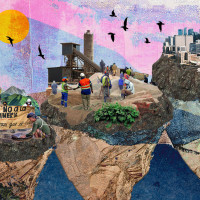
-
La financiación climática y la reparación climática Digging Deeper: Conversaciones sobre minería y transiciones justasFecha de publicación:
